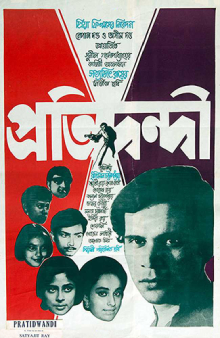
Dhritiman Chatterjee is an Indian actor. He began his acting career in 1970 as the protagonist of Satyajit Ray's Pratidwandi. Most of his acting work has been in India's "parallel", or independent, cinema with filmmakers such as Satyajit Ray, Mrinal Sen and Aparna Sen, among others and is noted for his acting skills. He has also worked in English films with well-known filmmakers such as Deepa Mehta and Jane Campion.

Apur Sansar, also known as The World of Apu, is a 1959 Indian Bengali-language drama film produced, written, and directed by Satyajit Ray. It is based on the second half of Bibhutibhushan Bandopadhyay's novel Aparajito. Following Pather Panchali (1955) and Aparajito (1956), The World of Apu is the final part of Ray's Apu Trilogy about the childhood and early adulthood of a young Bengali named Apu in early twentieth century India. The World of Apu stars Soumitra Chatterjee and Sharmila Tagore ; both actors would go on to appear in many of Ray's subsequent films.
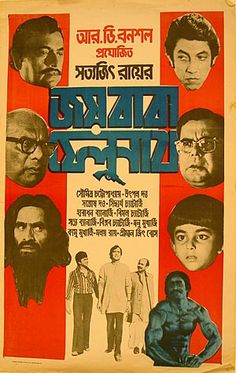
Joi Baba Felunath is a 1979 Indian Bengali-language mystery film directed and written by Satyajit Ray. Featuring an ensemble cast of Soumitra Chatterjee, Santosh Dutta, Siddartha Chatterjee, Utpal Dutt amongst others, it is an adaption of the eponymous Feluda novel and serves as the sequel of Sonar Kella. Shortly after the demise of actor Santosh Dutta who portrayed Jatayu's role, Ray remarked that it was impossible to ever make a Feluda film again without Dutta.
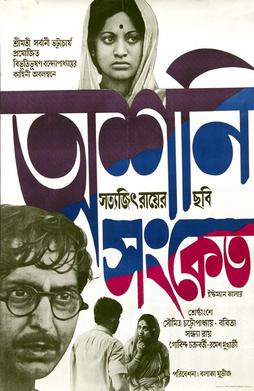
Distant Thunder is a 1973 Bengali film by the Indian director Satyajit Ray, based on the novel by the same name by Bibhutibhushan Bandopadhyay. Unlike most of Ray's earlier films, Distant Thunder was filmed in colour. It stars Soumitra Chatterjee, who headlined numerous Ray films, and the Bangladeshi actress Bobita in her only prominent international role. Today the film features in The New York Times Guide to the Best 1,000 Movies Ever Made. It marked the debut of the theatre star Mrityunjay Sil.

SoumitraChatterjee was an Indian film actor, play-director, playwright, writer, thespian and poet. He is regarded as one of the greatest and most influential actors in the history of Indian cinema. He is best known for his collaborations with director Satyajit Ray, with whom he worked in fourteen films.

Mahanagar is a 1963 Indian Bengali-language drama film written and directed by Satyajit Ray. Starring Madhabi Mukherjee in the leading role and based on the short story Abataranika by Narendranath Mitra, it tells the story of a housewife who disconcerts her traditionalist family by getting the job of a saleswoman. The film marked the first screen appearance of Jaya Bhaduri, one of Hindi cinema's leading actresses.
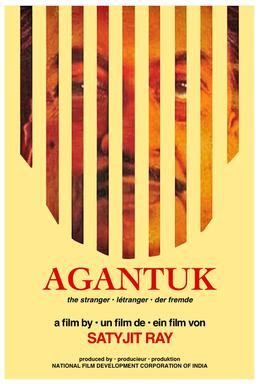
Agantuk is a 1991 Bengali-language drama film written and directed by Satyajit Ray. Notable for being Ray's last film, it was based on one of his own short stories, Atithi. A joint Indo-French production, it received financial backing from companies such as Gérard Depardieu's DD Productions and Canal+.
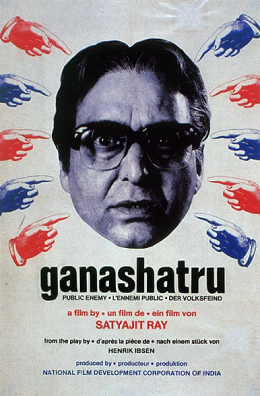
Ganashatru is a 1990 Indian film directed by Satyajit Ray. It is an adaptation of Henrik Ibsen's 1882 play An Enemy of the People, and was released under that title in the UK. The cast includes Ray's favourite actor Soumitra Chatterjee, and veteran actors such as Dhritiman Chatterjee, Shubhendu Chatterjee, Manoj Mitra and Ruma Guhathakurta. Ray adapts the play to an Indian setting: a flourishing township in which a temple attracts devotees as well as tourists. When a health problem is discovered, Dr Ashok Gupta, played by Soumitra Chatterjee, finds his popularity flagging. The film was screened out of competition at the 1989 Cannes Film Festival.

Jana Aranya is a 1976 Bengali film directed by Satyajit Ray, based on the novel of the same name by Mani Shankar Mukherjee. It is the last among Ray's Calcutta trilogy series, the previous two being, Pratidwandi and Seemabaddha.
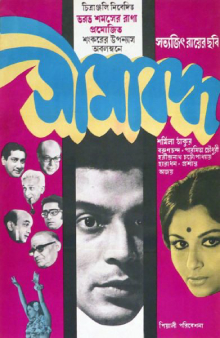
Seemabaddha is a 1971 social drama Bengali film directed by Satyajit Ray. It is based on the novel Seemabaddha by Mani Shankar Mukherjee. It stars Barun Chanda, Harindranath Chattopadhyay, and Sharmila Tagore in lead roles. The film was the second entry in Ray's Calcutta trilogy, which included Pratidwandi (1970) and Jana Aranya (1976). The films deal with the rapid modernization of Calcutta, rising corporate culture and greed, and the futility of the rat race. The film won the FIPRESCI Award at the 33rd Venice International Film Festival, and the National Film Award for Best Feature Film in 1971.
The Calcutta trilogy may refer to either of the following two Bengali film trilogies:

Satyajit Ray (1921–1992), a Bengali film director from India, is well known for his contributions to Bengali literature. He created two of the most famous characters in Feluda the sleuth and Professor Shanku the scientist. He wrote several short novels and stories in addition to those based on these two characters. His fiction was targeted mainly at younger readers, though it became popular among children and adults alike.

Sandip Ray is an Indian film director and music director who mainly works in Bengali cinema. He is the only child of the famous Indian director Satyajit Ray and Bijoya Ray.
Parallel cinema, or New Indian Cinema, is a film movement in Indian cinema that originated in the state of West Bengal in the 1950s as an alternative to the mainstream commercial Indian cinema.
Jayashree Kabir is a Bengali film actress. She acted in around 30 films in West Bengal and Bangladesh.

Subarnarekha is an Indian Bengali film directed by Ritwik Ghatak. It was produced in 1962 but not released until 1965. It is a part of the trilogy that includes Meghe Dhaka Tara (1960), Komal Gandhar (1961) and Subarnarekha (1962), all dealing with the aftermath of the Partition of India in 1947 and the refugees coping with it.
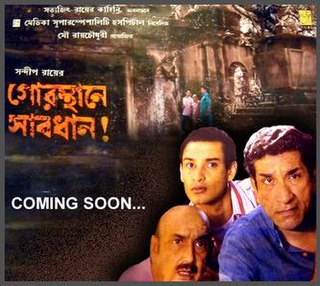
Gorosthaney Sabdhan is a 2010 Bengali thriller film directed by Sandip Ray based on the novel of the same name by Satyajit Ray. The film was released on 10 December 2010. It is different from most other Feluda stories, in the sense that this story is based on Feluda's hometown Kolkata (Calcutta). Most of Feluda's adventures take place as he and his company go to visit some place in India or outside. Here, however, Calcutta itself is the setting. It is the fourth film of the New Feluda franchise as well as the sequel of Tintorettor Jishu.

Satyajit Ray was an Indian film director, screenwriter, author, lyricist, magazine editor, illustrator, calligrapher, and composer. Ray is widely considered one of the greatest and most influential film directors in the history of cinema. He is celebrated for works including The Apu Trilogy (1955–1959), The Music Room (1958), The Big City (1963), Charulata (1964), and the Goopy–Bagha trilogy (1969–1992).[a]

Cinema of West Bengal, also known as Tollywood or Bengali cinema, is the segment of Indian cinema, dedicated to the production of motion pictures in the Bengali language widely spoken in the state of West Bengal. It is based in the Tollygunge region of Kolkata, West Bengal, India. The origins of the nickname Tollywood, a portmanteau of the words Tollygunge and Hollywood, dates back to 1932. It was a historically important film industry, at one time the centre of Indian film production. The Bengali film industry is known for producing many of Indian cinema's most critically acclaimed global Parallel Cinema and art films, with several of its filmmakers gaining prominence at the Indian National Film Awards as well as international acclaim.
